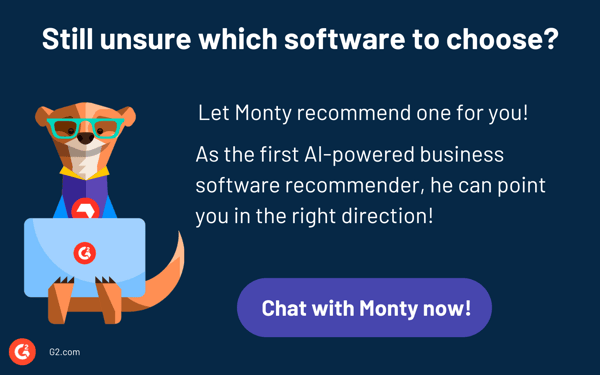July 1, 2025
 by Holly Landis / July 1, 2025
by Holly Landis / July 1, 2025
![G2CM_FI911_Learn_Article_Images_[investment_banking]_V1b G2CM_FI911_Learn_Article_Images_[investment_banking]_V1b](https://learn.g2.com/hs-fs/hubfs/G2CM_FI911_Learn_Article_Images_%5Binvestment_banking%5D_V1b.png?width=600&name=G2CM_FI911_Learn_Article_Images_%5Binvestment_banking%5D_V1b.png)
Far from the dramatized portrayals in popular media, investment banking operates at the core of global capital markets. It’s a strategic advisory engine that helps corporations, private equity firms, and government entities structure complex transactions — from IPOs and mergers to debt financing and restructuring.
This isn’t just about flashy deals or big numbers. Investment banks play a critical role in capital allocation, risk management, and long-term value creation across industries. For business leaders navigating growth, liquidity events, or international expansion, understanding how investment banking works can offer a competitive edge.
Investment banking is a financial service that helps corporations, governments, and institutions raise capital by underwriting securities, facilitating mergers and acquisitions, and providing advisory services. It includes activities like IPOs, bond offerings, and large-scale financial structuring.
Investment bankers are typically seen as the middleman between the investor and the seller, providing advice to either party and securing trades that will, hopefully, result in more capital for the investor.
As investment banking involves substantial sums of money, investment accounting software becomes critical for recording and assessing various aspects of the trade. The software is particularly important for monitoring market fluctuations so that clients are given up-to-date advice on when to buy or sell their securities.
Three main types of investment banks are determined by the size of the clients they work for and the investment portfolios they maintain.
Bulge bracket banks are the largest type and work internationally with the world’s biggest organizations and investors. These banks are familiar with handling multi-million, if not billion, dollar deals regularly, as most of their clients are Fortune 500 companies. They offer a full suite of services, from mergers and acquisitions to asset management.
Most middle-market banks work with clients who have risen above the boutique level but aren’t quite ready for a bulge-bracket bank. This can range from portfolios of around $50 million to over $500 million. While they typically have a national presence and cover more geographic regions than a boutique bank, they don’t always have the multinational capabilities of a bulge bracket bank. Nevertheless, they offer the same services as larger investment banks.
Boutique banks are the smallest subset of investment banks. They’re often regionally based, offering services to a handful of clients in a certain geographic market or industry. Due to their small size, these banks may only offer a select number of services, like mergers and acquisitions, within their region.
Most banks, even those that do not specialize in investment banking, offer some investment-based services such as underwriting and mergers and acquisitions. In contrast, investment-focused offerings are the primary function of investment banks.
Investment banks take on risks on behalf of their clients in exchange for a fee. In the process, the banks buy assets from their clients and sell them to the market or other investors. As there’s a risk that these assets might not sell, the bank charges a fee as compensation should this happen. This process is known as underwriting.
Underwriting is a vital process in the financial world. The level of risk is determined by thorough research, with underwriters examining the securities issuer's financial situation, such as cash flow and debts. From there, the underwriter sets the stock pricing for sale.
As this price is set on a case-by-case basis, this ensures that all stock is priced fairly for the entire market and allows investment banks to set fairer loan rates that they think will be the least risky and turn the highest profit.
Underwriting for companies going through the Initial Public Offering (IPO) process ensures they can raise the capital needed to go public, as their financial history has been reviewed independently by the underwriters. This means that anyone interested in buying stock, and providing this necessary capital to the company, has greater insight into the possible risks involved before handing over their investment money.
Investment banks assist companies in buying and merging with other firms. They assess the financial history of the company being bought and determine the worth of the potential acquisition. They advise their clients on profitable investments.
Investment banks can act as advisors to both the acquiring and selling companies during the M&A process. These banks help the selling companies determine a fair asking price for the acquisition.
Investment banks have a significant network of investors and corporations that may be interested in working with other companies. They assist with all stages of selling and trading financial assets and investments.
This branch of an investment bank is responsible for analyzing the current state of the market and reporting on investment opportunities for its clients. Analysts in the equity research department provide investors with detailed reports on whether they should buy, sell, or hold an investment based on how the company is performing within the wider marketplace.
Companies of all sizes hold a range of financial assets at any one time, from stocks and bonds to tangible assets like real estate. Investment banks provide management services for a business's full portfolio of assets, providing ongoing support and guidance on how best to manage these financial assets.
To help clients manage complex financial risks, full-service banks offer derivatives structuring, hedging strategies, and financing solutions. These include products like interest rate swaps, credit default swaps, and securitizations, which enable companies to stabilize cash flows and reduce exposure to market volatility.
Many full-service banks integrate corporate banking functions, offering lending, cash management, and treasury solutions. These services support day-to-day operational financing needs alongside strategic capital market activities.
A quick comparison to help you understand the key differences between investment banking and asset management.
| Feature | Investment banking | Asset management |
| Primary function | Raise capital and advise on transactions | Manage investment portfolios for clients |
| Revenue model | Fees from advisory, underwriting, and trading | Management fees, performance-based fees |
| Client types | Corporations, governments, institutions | Individuals, pension funds, endowments |
| Risk exposure | Underwriting risk, market risk on trading desks | Market risk on invested assets |
| Typical activities | M&A, IPOs, debt issuance, trading | Asset allocation, portfolio management |
Investing money and financial assets can be daunting, especially if you’ve never worked with an investment bank. But their job is to help you make the best decisions for your money, so going into the process with a few key objectives in mind will help you make the most of this relationship:
For companies managing many investments, dedicated portfolio management software is the most effective way to track performance and gain clear insights into whether your investments are still delivering value.
This software simplifies complex data, helps identify trends, and ensures you stay informed so you can make timely, informed decisions that align your portfolio with your financial goals.
G2 provides trusted insights from finance teams managing diverse investment portfolios, helping you choose the right portfolio management software.
To be included in the investment portfolio management category, platforms must:
Here’s a look at some of the top five leading investment portfolio management software solutions according to G2's Summer 2025 Grid report. Some reviews may be edited for clarity.
Morningstar Direct is a leading investment portfolio management platform that combines extensive global market data with powerful analytics and reporting capabilities. Ideal for asset managers and institutional investors, it supports comprehensive portfolio analysis, risk assessment, and performance benchmarking to help users make well-informed investment decisions.
"The data quality is strong, but what stands out are the analytics, visuals, and the storytelling that connects it all, primarily through the Presentation Studio feature."
- Morningstar Direct Review, Matthew B.
"The Excel formulas aren't as intuitive or efficient as possible. Bloomberg is much better in this area, and Morningstar Direct needs significant improvements to boost functionality and ease of use."
- Morningstar Direct Review, Sergi C.
Morningstar Direct Advisory Suite is a robust investment portfolio management platform for financial advisors and wealth managers. It offers robust analytics, comprehensive market data, and customizable reporting tools to help professionals precisely create and manage client portfolios. The platform’s extensive data coverage and intuitive interface enable users to effectively uncover insights, optimize asset allocation, and monitor portfolio performance.
"One of the best features is viewing model statistics without opening a draft PDF, which saves a lot of time, especially when comparing models. Another great feature is the ability to compare ETFs and mutual funds side-by-side, which wasn't possible before. Overall, the presentation tools for data analysis feel streamlined and efficient."
- Morningstar Direct Advisory Suite Review, Philip K.
"My main issue is with the drop-down menus. The subcategories aren't organized in any particular order. It would be much better if they were alphabetical. This problem has worsened over time as more information has been added."
- Morningstar Direct Advisory Suite Review, Geoffrey K.
Koyfin is an investment portfolio management and financial analytics platform that delivers real-time market data, advanced charting, and comprehensive portfolio tracking tools. Designed for investors and portfolio managers, Koyfin provides easy access to detailed financial information and customizable dashboards, helping users monitor investment performance and identify market trends efficiently.
"I've tried many portfolio management tools, and Koyfin has been the best solution. It's easy to create individual portfolios and household groupings, and to compare current versus proposed portfolios. The Koyfin team is responsive and has added features based on requests. I use it daily to track positions, answer client questions about stocks and ETFs, and stay updated on market trends."
- Koyfin Review, Dace D.
"While functionality improves, the platform can sometimes feel clunky and less smooth than expected. It's still evolving from a data-focused platform into a full tool advisors can use for tracking, monitoring, and reporting."
- Koyfin Review, Gautam C.
Betterment at Work is an investment portfolio management solution tailored for employer-sponsored retirement plans. It offers automated portfolio management, personalized advice, and streamlined administration, making it easier for companies to help employees grow their retirement savings while maintaining diversified portfolios aligned with individual risk preferences.
“The low fees and user-friendly accessibility were the main reasons we chose Betterment initially, and these remain strong advantages. Users find the information easy to understand, and overall, employees haven’t experienced significant issues.”
- Betterment at Work Review, Jacob I.
"The transition to Betterment from our previous 401(k) platform was initially challenging and complicated. However, it’s unclear how much of this was due to the complexities of our old system. Since completing the switch, I’ve been delighted with Betterment’s services."
- Betterment at Work Review, Molly S.
Betterment Advisor Solutions is an all-in-one custodial platform designed specifically for independent RIAs. It helps advisors serve more clients efficiently across investing, retirement, and cash management.
The platform offers automated back-office and portfolio management software combined with high-touch service and support. From onboarding and setup to daily troubleshooting and practice management consulting, Betterment aims to provide a smoother experience than traditional custodians.
"I enjoy sending our new clients a link to open their account(s). This way, they can input their information. I like being able to send onboarding reminders through the platform. Tax harvesting and allocation changes are made easy as well."
- Betterment Advisor Solutions Review, Shawna H.
"Occasionally, I run across account types (until recently, Solo 401ks—although they have just added that) or certain service requests that cannot be handled cleanly. But these are few and far between, and very rarely is it an issue, as usually there is some workaround."
- Betterment Advisor Solutions Review, Justin C.

Investment banking doesn’t need to be complicated. Working with expert investors to trade and manage your financial assets can help you diversify your portfolio and effectively mitigate the risks of the ebb and flow of global financial markets.
Generate detailed, transparent, and timely reports that keep investors informed and confident, with investor reporting software designed to simplify communication and showcase portfolio performance.
This article was originally published in 2024. It has been updated with new information.
Holly Landis is a freelance writer for G2. She also specializes in being a digital marketing consultant, focusing in on-page SEO, copy, and content writing. She works with SMEs and creative businesses that want to be more intentional with their digital strategies and grow organically on channels they own. As a Brit now living in the USA, you'll usually find her drinking copious amounts of tea in her cherished Anne Boleyn mug while watching endless reruns of Parks and Rec.
When most people think about turning a profit from a business, they assume it comes from...
 by Holly Landis
by Holly Landis
Information technology is at the forefront of modern businesses.It’s the core element that...
 by Sagar Joshi
by Sagar Joshi
Tired of lost bug reports and endless email threads?
 by Washija Kazim
by Washija Kazim
When most people think about turning a profit from a business, they assume it comes from...
 by Holly Landis
by Holly Landis
Information technology is at the forefront of modern businesses.It’s the core element that...
 by Sagar Joshi
by Sagar Joshi

